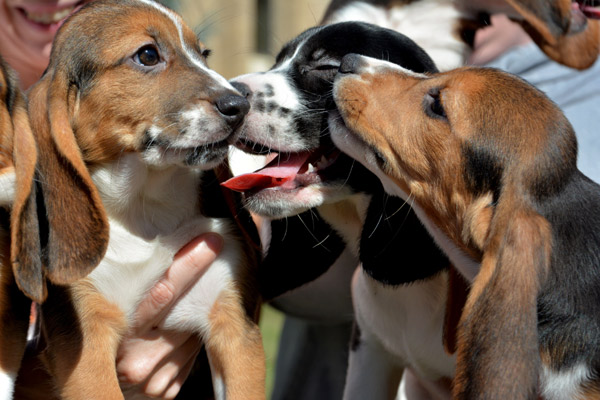7 half-pound mutts become first test-tube puppies in world
Updated: 2015-12-10 11:34
(Agencies)
|
|||||||||||
LOS ANGELES - A team of veterinarians, scientists and lab workers gathered around a surrogate hound and watched her give birth to seven half-pound puppies, the first dogs ever conceived in a test tube.
"We each took a puppy and rubbed it with a little towel and when it started to squiggle and cry, we knew we had success," said Dr. Alexander Travis, who runs the lab at the Baker Institute for Animal Health at Cornell University's College of Veterinary Medicine in Ithaca, New York.
"Their eyes were closed. They were just adorable, cute, with smooshed-in faces. We checked them to make sure they looked normal and were all breathing," he said.
The puppies born July 10 are a mix of beagle, Labrador and cocker spaniel and are now healthy 5-month-olds, Travis said. All but one female were adopted. She's being kept by the lab to have her own litter.
The lab kept track of the puppies by painting their nails with different color polish. Travis adopted two, still known by their nail polish names, Red and Green.
In vitro fertilization, the process of fertilizing an egg with sperm outside the body, is widely used to assist human reproduction these days. The first human birth from IVF took place in 1978.
But IVF efforts with dogs repeatedly failed until now, according to Dr. Pierre Comizzoli, a reproductive physiologist for the Smithsonian Conservation Biology Institute in Front Royal, Virginia, which works with Cornell.
"The biology of the dog is really, really different than humans," Comizzoli said. Dog pregnancies last only two months and females go into heat just once or twice a year, releasing immature eggs instead of mature eggs needed for IVF.
An earlier experiment at Cornell helped pave the way. In 2013 at Cornell, Klondike became the first puppy born from a frozen embryo. Klondike's beagle mother was fertilized using artificial insemination. Her embryos were collected, frozen and implanted in Klondike's surrogate mother.
Comizzoli described the birth of the seven puppies "as a huge breakthrough."
A paper describing the Cornell litter as "the first live births from in vitro fertilized embryos in the dog" appeared Tuesday in the PLOS ONE journal. The lead author, Smithsonian Conservation Biology Institute doctoral fellow Jennifer Nagashima, said IVF technology in dogs could prove useful in everything from conserving endangered species to removing "deleterious traits from breeds," with research potentially applicable to "models for human disease" as well.
Related Stories
China's first 'test-tube baby' adjusts life as newsmaker 2015-11-14 08:15
12 test-tube babies born in Xiamen per day: report 2015-06-24 16:12
First test-tube monkeys given birth in China 2008-09-11 10:41
Today's Top News
Unregistered citizens to finally gain recognition
Aging population could shrink workforce by 10%
China seeks advice of foreign experts on economic blueprint
Aging population could shrink workforce by 10% in China
Czech president warns of terrorist attack
EU members agree on bloc's first cyber-security law
Beijing issues first red alert for heavy air pollution
Dutch collector puts conditions on statue's return
Hot Topics
Lunar probe , China growth forecasts, Emission rules get tougher, China seen through 'colored lens', International board,
Editor's Picks

|

|

|

|

|

|







